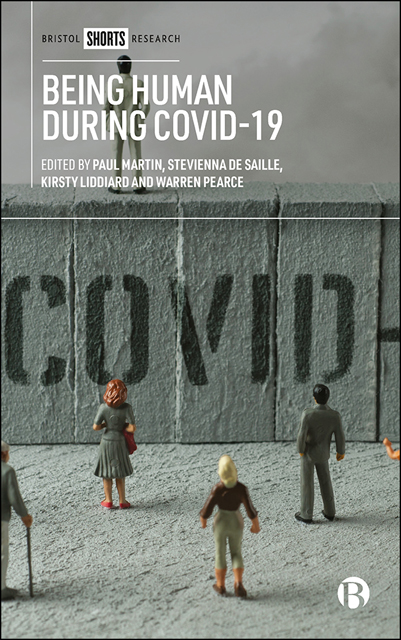six - Imperilled Humanities: Locked Down, Locked In and Lockdown Politics During the Pandemic
Published online by Cambridge University Press: 13 October 2022
Summary
Introduction
Our contemporary times are marked by human precarity. This precarity is, however, neither shared, universal nor new. We know that Black, disabled and poor people are disproportionately affected by COVID-19. While it is easy to explain this in terms of the unprecedented impacts of COVID-19, we know that Black, disabled and poor people have been disproportionately affected by the pandemic because of years of systemic racism, toxic capitalism and austere underfunding of health, education and social care. These seemingly disposable lives are routinely devalued. How can researchers engage with people who have been further dehumanized by the pandemic? We offer a response to this question in the context of the Black Lives Matters protests of spring 2020, with reference to the global pandemic that has had disproportionate and inequitable impacts, with a specific consideration of the particularly precarious position of disabled, poor and Black people.
Locked down
There is always a danger of reading these tumultuous times as marking a new ground zero of human suffering. Here we are, so a popular narrative tells us, enduring one of the lowest points in human history. But some of us have been here before; times where certain human lives are deemed more worthy than others. Spring 2020. CNN news is playing in the background. We are struck by the public spectacle of the Black Lives Matter protests in the States. It jars with our own solitary reality. Like many around the world, We’re staying-at-home, although stuck-at-home feels like a more authentic description. The films rolling before us indicate that the protestors are masked. Social distancing is seemingly being observed. Organized marches wind their ways down major roads in cities across the US. The protestors are clearly putting themselves at risk of transmission. This is not a criticism. It is a commentary on the insecure positions that the activists are prepared to subject themselves to in the service of collectively challenging systemic racism. They seem to be saying: “At risk of the virus? We’ve been at risk of racism for far longer”.
While we are taken by the strength in numbers of the Black Lives Matter activists, the ubiquity of the ‘Fuck Trump’ banners and the righteous fury on their faces, these displays of dissent contrast so markedly with the current isolation of a number of disabled friends of mine.
- Type
- Chapter
- Information
- Being Human during COVID-19 , pp. 53 - 59Publisher: Bristol University PressPrint publication year: 2022
- 1
- Cited by

